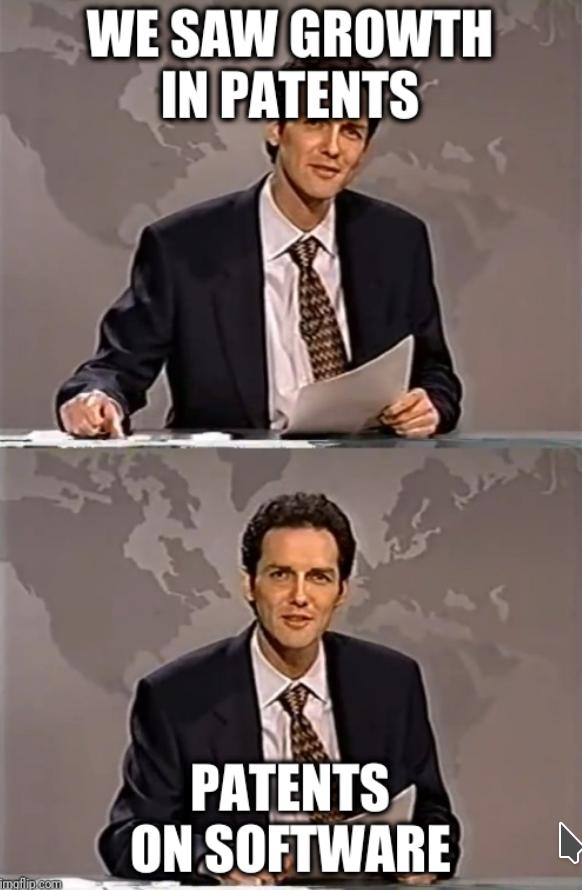

THE DANCE or the "waltz" around the term "software patents" isn't a new thing. The EPO has done that for well over a decade, preceding the Mafioso and and his 'son'. "CII" used to be the most common dance around the most meaningful and fundamental term, but people caught up with the true meaning of it; so the game of words moved on a bit, with "CII" being more like the old and familiar 'dinosaur'. When one says "CII" inside and outside the EPO people generally know that it's a synonym ("software patents" with words like "invention" inserted for extra excitement). Who would deny a patent on an actual "invention"? After all, algorithms are inventions in the same sense cookie recipes are inventions. Or mathematical formulae.
"It brags about granting illegal patents."Anyway, today's European Patent Office (EPO) illegally grants patents on all sorts of things and then brags about it. It brags about granting illegal patents. The people who manage the EPO aren't coders and they don't really understand what they grant patents on. All they care about it a bunch of graphs and plots moving upwards. What about quality? They call speed "quality"; the faster they grant, the better the... quality?!
Just before the weekend the EPO boasted: "With a #patent application increase of 10%, #computertechnology was the second fastest growing technology field at the EPO in 2019. https://bit.ly/DigitalisationIndex … #EPOPatentIndex"
Oh, here we go again with "DigitalisationIndex" and "computertechnology" (so broad and vague a category). Then they did "DataRetrieval"; More buzzwords for illegal software patents that aren't allowed in Europe -- patents that the EPO is granting and mostly to American firms (US and Canada), by its very own admission: "In #DataRetrieval, applicants from the US led in terms of share (48%), while EPO member states (23% share) continue to steadily innovate in this field. Further details: https://bit.ly/DigitalisationIndex … #EPOPatentIndex"
So they're granting loads of software patents, giving these monopolies to American companies. What's in it for Europe? Nothing.
The EPO also tweeted: "Applications in image data processing and generation have also spiked. From 2018 to 2019, the field received 11% more #patent applications. https://bit.ly/DigitalisationIndex … #EPOPatentIndex"
This is my area of research. More illegal software patents are being granted, soon to be categorised as "image data processing and generation" (that's maths!). These patents are being illegally granted by corrupt EPO management, looking to fake 'growth'. It'll certainly pave the way for frivolous litigation and extortion in Europe. All this to the detriment of everyone but patent trolls and law firms...
The EPO then tweeted: "Our European Patent Academy's #elearning centre offers a broad range of online training courses on #patents and IP topics. http://bit.ly/EPO_eLearning"
This page starts with "Videogaming and IP: how to play the game" -- another class of software patents (on games).
Are the EPO's best spinners ill? Are they replaced by cheaper PR staff that's openly bragging about software patents several times per day?
The EPO also bragged: "Between 2018 and 2019, the EPO posted a 29% overall increase in patent applications in #MachineLearning and #PatternRecognition. https://bit.ly/DigitalisationIndex … #EPOPatentIndex"
How much more obvious can it get? Those are software patents! No question about it. There's not even a "device"...
In other words, the corrupt EPO management decided to break the law (yet again) and allow such patents against all treaties and laws. This while shielded -- with diplomatic immunity of course! -- so the people responsible for this crime will never be held accountable.
They're setting up an avalanche here. The US saw the same thing. Here's a brand-new example of "CII" falling on its sword again at the Federal Circuit in the US. It's a “computer-implemented method for notifying users having patents of subsequent publications that reference the patents.”
Here's what happened, as reported a couple of days ago:
The Federal Circuit has an internal practice of only issuing R.36 affirmances-without-opinion in cases where the court holds oral arguments. Most of the oral arguments have been cancelled for the court’s April sitting. The result then is that either (1) the court is going to write a lot more opinions or (2) the court will shift its practice to now start issuing no-opinion judgments even without oral arguments.
Today's short decision in In re Thomas (Fed. Cir. 2020) (per curiam) suggests to me that the court will be writing the opinions. Douglass Thomas is a patent attorney and his claimed invention is a “computer-implemented method for notifying users having patents of subsequent publications that reference the patents.” The examiner rejected the claimed invention as ineligible and that decision was upheld by the PTAB (along with finding the claims anticipate/obvious).
epo.org link and requires JavaScript to view) says: "In this webinar we will present the emergence of Blockchain related technologies in terms of patenting activity. Blockchain has captured the attention of the public and research has intensified in this field over the last few years, making it a highly interesting topic of study for patent analysis in order to obtain insight into the developments of this emerging technology."